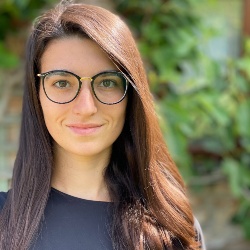Mollie Arbuthnot, PhD Russian Studies
Mollie Arbuthnot won 'Best Outstanding Output for the Faculty of Humanities 2019/20' at the Manchester Doctoral College Excellence Awards.

In just the second year of her PhD, Mollie’s article on Soviet culture in Russia in the 1920's, was accepted into the most prestigious journal in Russian Studies.
“An article I wrote based on a research trip to Russia in 2017 was published in the Slavic Review journal in 2019. I spent several months in Moscow and St. Petersburg digging around in archives, libraries, and museum collections, looking for material about visual propaganda in the early-Soviet period.”
“This hadn’t been much discussed by historians or art historians in the context of political propaganda, so I decided to write about it myself.”
“In many ways this is the most exciting aspect of doing historical research: accidentally stumbling across something that captures your imagination.”
Mollie Arbuthnot / PhD Russian Studies
“The most interesting part of being a postgraduate student has been discussing research ideas with other people, be that at conferences, with other students at Manchester, or with my supervisor. I love hearing about other people’s research projects! Everyone has their own perspective and their own expertise, and that’s what makes these discussions enriching.”
“I had the opportunity to teach at the University, running seminars and tutorials for undergraduates and MA students. This was a great experience in itself, and often the students would come up with ideas that made me think about a topic in a new way; teaching and learning work both ways.”
“Mollie’s article ‘The People and the Poster: Theorising the Soviet Viewer’ was published in the most prestigious journal in Russian Studies, Slavic Review", says Vera Tolz-Zilitinkevic, Sir William Mather Professor of Russian Studies, School of Arts, Languages and Cultures.
"On the basis of implacable archival research and innovative engagement with theoretical work in art history on how the meaning of art objects is created by viewers, Mollie’s article boldly challenges assumptions about the origins of Socialist Realism, the USSR’s official artistic style, that have been held by scholars of Soviet culture for decades.
"This historical article has direct relevance to our understanding of new forms of ‘propaganda’ currently being developed by Russia.”
